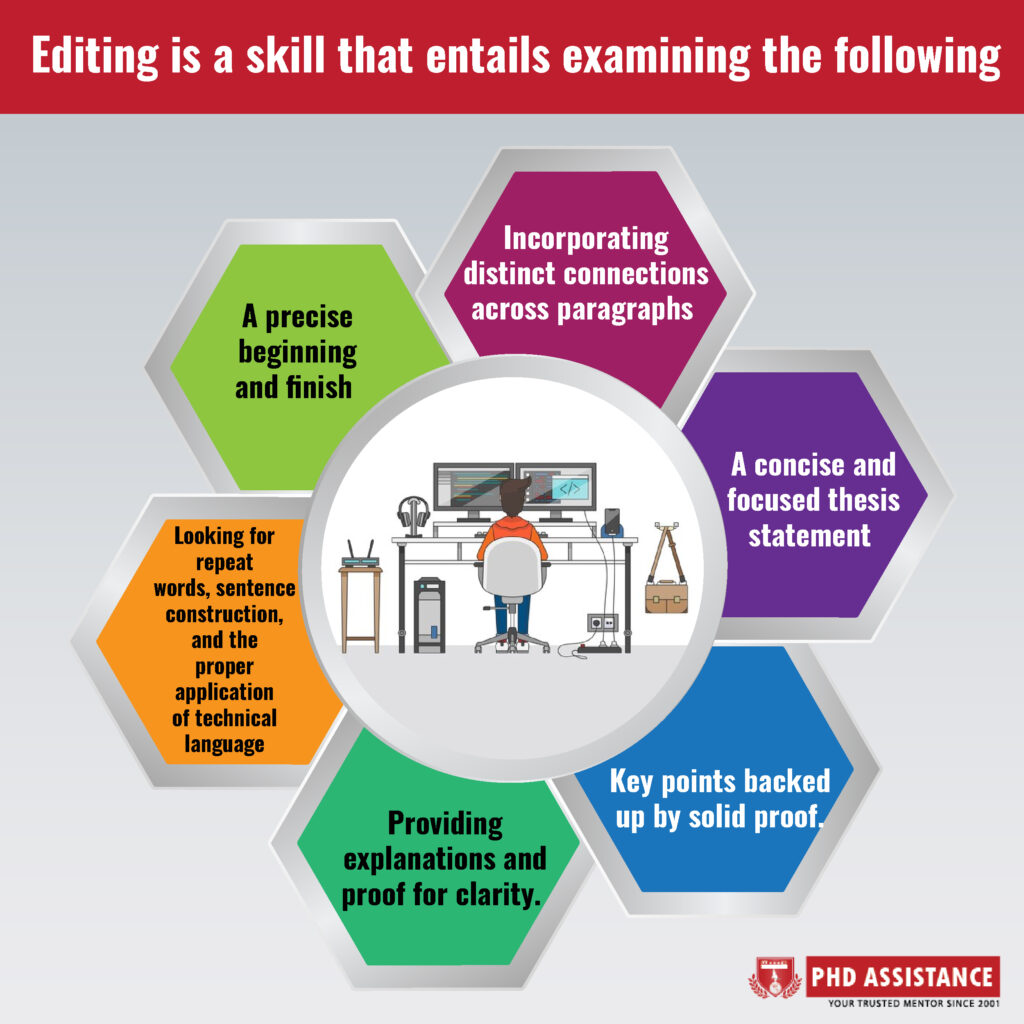How proofreading and editing helps in improving the content quality of Dissertation
Introduction
When a thesis is approved, scholars derive satisfaction. Grammar mistakes, on the other hand, can have a detrimental impact on their work. The proofreading and editing stages of the process of writing are critical. They aid in the lucidity of your thoughts and the efficacy of your writing. Rereading your document to look for even more serious errors, such as organization, sentence structure, and substance, is part of the editorial process. When you are proofreading, on the other hand, you’re looking for and resolving errors in text, syntax, and vocabulary. For Proofreading and Editing Helps, you can contact PhD Assistance.
The Editing Process
Editing is a skill that entails examining the following:
- A precise beginning and finish
- Incorporating distinct connections across paragraphs
- A concise and focused thesis statement
- Key points backed up by solid proof.
- Providing explanations and proof for clarity.
- Looking for repeat words, sentence construction, and the proper application of technical language.
The Proofreading Process
Proofreading necessitates a sharper eye to see mistakes and apply the essential adjustments to strengthen your thesis. Take your time, break the thesis down into segments, and look for prevalent mistakes. Tables and figures are notably helpful in technical writing because they allow users to analyze and visualize information. PhD Assistance is reliable for its Quality of Dissertation Services.

Factors for presenting a high quality Dissertation
- Adequate Literature Review: Whenever it pertains to locating material that adds weight to their study, some scholars are confused. A thesis is typically expected to include a wide range of topics. Using out-of-date material may lead to rejections.
- Errors in Research and Methodology: Every research study has a method of analysis that the author (researcher) must adhere to. Because of the complexities of systematic review, some writers may provide analysis process that is insufficient. Insufficient data raises doubts about a manuscript’s legitimacy.
- Plagiarism of Materials and Citations: Plagiarism is a prevalent crime in academia, and it has major ramifications. Papers with verbatim text from published literature are considered significant errors. Cribbed work is usually rejected outright in most circumstances.
For any requirement of PhD Thesis Editing Help, contact PhD Assistance
Common Grammatical Errors
- Spelling mistakes have an impact on a manuscript’s Grammar mistakes can potentially change the connotation of the sentence. Take the time to properly proofread your find ways to prevent making this mistake.
- A colon usually marks the beginning of a checklist. There is, however, a restriction regarding the usage of colons in lists. Avoid employing a colon if the part of the statement preceding the colon appears to be unfinished without both the parts.
- Using a comma to join two distinct sentences is incorrect. The sense of a statement can be changed by accidentally dropping or removing commas.
- Apostrophes: Using the apostrophe correctly can drastically alter the connotation of a statement. They’re utilized to indicate possessive forms, contractions, and other things. Apostrophes are not used in plural forms. The words “it’s” and “its” have the same spelling but denote distinct things.
- Quotes with periods before or after them: The end of a sentence is always marked with a period. When authors are in a rush, they frequently forget to put the period. The debate over whether to put the period before or after quotes is more essential. Both of these guidelines are followed by many style guides. In American English, the period (or any other punctuation mark) occurs before the quotation marks, whereas in British English, the converse is true.
- When there are too many exclaim points in a text, each one loses its impact. Instead of stressing each argument, it confuses the readers and diminishes the importance of each one.
- Punctuation markings such as hyphens, em dashes, and en dashes have a similar appearance but vary widely in length and usage. Hyphens are used to describe a noun in a sentence. The en dash is shorter than the hyphen, whereas the em dash is longer.
Long phrases with no punctuation that include numerous ideas may be hard to decipher. Short sentences might convey the very same information in a more straightforward manner.
You can always rely on PhD Assistance for Content Quality of Dissertation, and Academic Editing and Proofreading Services,
Conclusion
Academic writing is time-consuming, yet it can be extremely rewarding. Look out for typical grammar mistakes. Plagiarism is often unintentional, so double-check to be sure you haven’t plagiarized. Never be in such a haste to finish your project that you forget to proofread it. Proofreading increases the paper’s quality by ensuring that there are no residual flaws and eliminates broad communication errors or contradictions in the composition.
Contact PhD Assistance for any of your PhD requirements as we offer PhD Dissertation Writing UK, Content Quality of Dissertation Proposal UK
 Previous Post
Previous Post Next Post
Next Post
